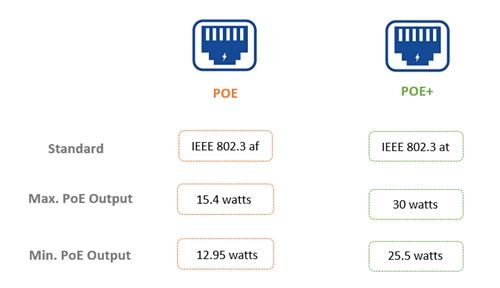When purchasing a 1G PoE switch, we typically focus on the number of ports. However, power consumption is usually linked to port numbers to meet various wattage requirements. For example, a small 8-port PoE switch may offer options of 130W or 240W. A high-density 48-port PoE switch may provide up to 740W of power. Therefore, a medium-sized 24-port PoE switch with appropriate power consumption would be a viable solution for wide network applications.
Since PoE switches fail to provide sufficient power for Powered Devices (PDs) leads to low performance or random disconnections. On the other hand, for cost-effectiveness, choosing a 24-port PoE switch with an excess power budget would be a waste of money. This article will discuss PoE switch power consumption and recommend two 24-port PoE switches with different power consumption: 370W vs 740W, for your consideration.
24 Port PoE Switch Power Consumption Explanation
Total Power Consumption
The power consumption of a 24-port PoE managed switch refers to the maximum total power that the 1G PoE switch can supply to all connected PDs. In simpler terms, the total power wattage of all connected PDs must not exceed the power consumption of the 24-port PoE switch. Hence, before deciding on which power consumption PoE switch to purchase, it is essential to calculate the total power wattage of the PoE-powered devices that need to be used.
Per Port Power Consumption
Another crucial parameter of the 24-port PoE switch is the power consumption per PoE port, which is defined by either the PoE standard (IEEE802.3af) or the PoE+ standard (IEEE802.3at). A switch compliant with the PoE standard can deliver up to 15.4W of output power per port, while the PD receives 12.95W of input power due to transmission loss. Similarly, for a PoE+ switch, the corresponding figures are 30W and 25.5W, respectively.
Figure 1: 24 port PoE switch power consumption PoE vs PoE+ standard comparison.
24 Port PoE Switch 370W vs 740W Power Consumption Comparison
The power consumption of 370W and 740W in 24-port PoE switches caters to different levels of power wattage. Taking the S3400-24T4FP 370W and S3410-24TS-P 740W PoE switches as examples, let’s compare the scenario when fully loading these two 24-port 1G PoE switches with IP cameras. Dividing 370W and 740W by 24, we get per-port power consumption of 15.42W and 30.83W respectively. This means the 740W power consumption 24-port PoE+ switch can support 24 higher-power IP cameras compared to the 370W switch. The suggestion is: If you need to use a large number of higher-power PDs, then the 740W 24-port PoE switch would be a safer and more forward-thinking choice.
Figure 2: FS 24 port PoE switch power consumption 370W vs 740W model comparison.
24 Port PoE Switch 370W vs 740W Recommendation
Here we recommend the aforementioned advanced FS 24-port PoE switches, namely the S3400-24T4FP 370W and S3410-24TS-P 740W, for your consideration. These 24-port 1G PoE switches comply with IEEE 802.3af/at standards, allowing them to distinguish between PoE and PoE+ standards to ensure precise power delivery. Consequently, the FS 24-port PoE switch can deliver up to 30W per port, making it ideally suited for security cameras, IP phones, and wireless access points (APs).
In addition to its high power consumption PoE capability, the FS 24-port PoE managed switch boasts multiple port configurations designed to seamlessly integrate into various networks. This PoE switch consolidates 24 RJ45 auto-sensing 10/100/1000Mb PoE ports, 2 1Gb SFP ports, and 2 SFP/RJ45 combo ports into a compact 1RU form factor. The 24 PoE ports can accommodate up to 24 PDs simultaneously connected to the switch within budget constraints. Furthermore, the 2 SFP ports offer optional fibre cabling and support link aggregation of multiple switches, while the 2 SFP/RJ45 combo ports further enhance network resiliency.
Conclusion
Power consumption is a crucial factor to consider when selecting a cost-effective PoE switch. When deciding between a 370W and a 740W 24-port PoE switch, it’s essential to determine the rated wattage of each PD and calculate the total power budget for all devices. Ensure that the power consumption per port of the PoE switch doesn’t exceed the requirements of individual devices or the maximum power threshold of the switch itself.
If the S3400-24T4FP 370W model doesn’t meet your current needs or anticipated expansion of access points, consider upgrading to the S3410-24TS-P 740W version. Regardless of your choice, you can trust that FS.COM offers competitive prices for 24-port PoE switches in the market.






